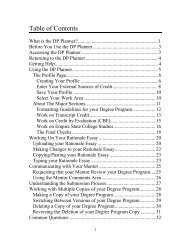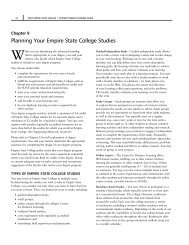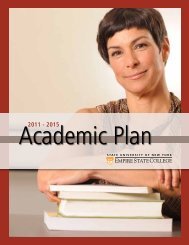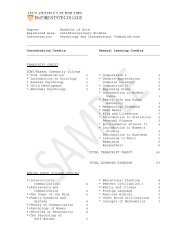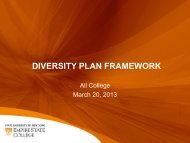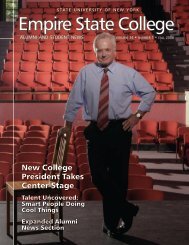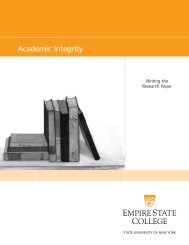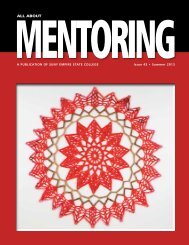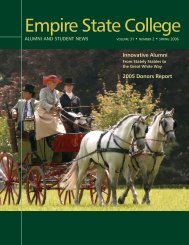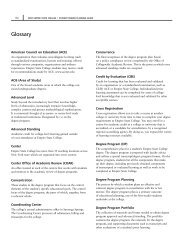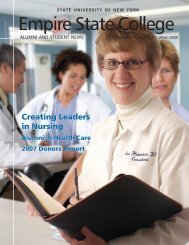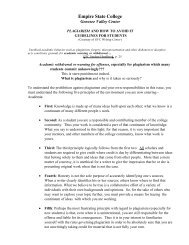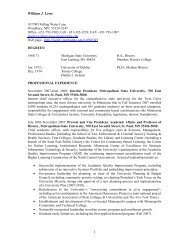All About Mentoring Spring 2011 - SUNY Empire State College
All About Mentoring Spring 2011 - SUNY Empire State College
All About Mentoring Spring 2011 - SUNY Empire State College
Create successful ePaper yourself
Turn your PDF publications into a flip-book with our unique Google optimized e-Paper software.
73<br />
“Music never stops; it is we who turn away” –<br />
John Cage<br />
Tina Wagle, School for Graduate Studies<br />
A Review of:<br />
Dear Maxine: Letters from the Unfinished<br />
Conversation with Maxine Greene<br />
Edited by Robert Lake<br />
Irecently read Dear Maxine: Letters<br />
from the Unfinished Conversation with<br />
Maxine Greene (2010) and wanted to<br />
offer some reflections inspired by the work<br />
for <strong>All</strong> <strong>About</strong> <strong>Mentoring</strong>. For those not<br />
familiar with her work, Maxine Greene is<br />
said to be the most profound educational<br />
philosopher since John Dewey. A prolific<br />
author and educator, Greene holds a deep<br />
respect for the arts and humanity and is able<br />
to see potential in everything and everyone.<br />
The book is a collection of letters written<br />
to Greene by friends and scholars, many of<br />
whom also are considered to be leaders in<br />
education today, including Shirley Steinberg,<br />
Mike Rose, Elliot Eisner, Gloria Ladson-<br />
Billings and William Ayers, just to name a<br />
few. The letters are poignant and moving.<br />
They speak not only to the body of work<br />
Greene contributed over the years, but also<br />
to the profound impact her work has had<br />
on educators globally and perhaps more<br />
importantly on the art of thinking critically<br />
and innovatively.<br />
The words of 20th century American<br />
composer John Cage – doubling as the title<br />
for this piece – come from his Composition<br />
in Retrospect (1983) and were cited by Julie<br />
Searle in her letter to Maxine. The reason I<br />
chose this title is because as I was reading<br />
the book, I was struck by the importance<br />
of reflection. Greene believes that one’s<br />
imagination is the key to conceptualizing<br />
a better future. It is the imagination that<br />
allows us to think critically and reflect in a<br />
way that is open and visionary. Reflection<br />
is an act we often encourage our Master<br />
of Arts in Teaching (M.A.T.) students to<br />
engage in throughout their course work, and<br />
crucially it exists as a requirement for the<br />
final portfolios they create at the end of the<br />
program. We ask them to reflect on the past<br />
three years as they transition from student<br />
to teacher. We believe that such moments of<br />
reflection are important in demonstrating<br />
growth and lifelong learning. And yet, as<br />
I read and thought about Greene and the<br />
authors of these letters to her, I wondered,<br />
“When was the last time I allowed myself to<br />
reflect on imaginative pedagogy or sit with<br />
my own critical thoughts”<br />
The field of teacher-education is changing.<br />
More and more standards are being imposed<br />
on students, competitors from businesses<br />
outside of the educational arena are entering<br />
the fray, and the demands upon teachers<br />
are greater than ever. In order to house<br />
a quality teacher-education program, we<br />
cannot be oblivious to this bigger picture;<br />
we must keep up with these changes; we<br />
have to be diligent in what we offer our<br />
students in order for them to be successful<br />
in their own classrooms. We have necessarily<br />
been preoccupied with these demands,<br />
which have required tremendous time<br />
and attention. It would be irresponsible<br />
of us to imagine they do not exist. But<br />
what does all of this attention do to our<br />
lives as reflective practitioners<br />
I think many of us at <strong>Empire</strong> <strong>State</strong> <strong>College</strong><br />
often say how busy we are – myself<br />
included. But as I allowed myself time to<br />
read this tribute to Maxine Greene, I was<br />
drawn back to my own roots in the social<br />
foundations of education and to the core of<br />
that work, which is about thinking – about<br />
reflecting – and, importantly too, about<br />
being hopeful about education. So, as I read<br />
the Cage quote, I asked myself whether any<br />
time that was lost not thinking this way was<br />
my own fault. “The music never stops; it is<br />
we who turn away.” I think I turned away.<br />
Despite the daily grind of conference calls,<br />
contract evaluations and email, I need to<br />
pause and reflect on the bigger picture of<br />
education and learning. I need to remember<br />
what matters to the greater good of society<br />
and to social justice. These are the ideals<br />
that have been a constant passion in my life<br />
and career.<br />
In the introduction to this book, the<br />
educational philosopher Nel Noddings<br />
states correctly that education has strayed<br />
incredibly far from the vision Maxine<br />
Greene articulated when writing The<br />
Dialectic of Freedom in 1988. “Her hope<br />
was to open possibilities for all students<br />
to achieve some measure of freedom in<br />
recognizing possibilities and directing their<br />
own lives. In contrast, today’s policies aim<br />
to control the lives of students through<br />
uniform preparation, uniform achievement,<br />
and uniform futures” (xxi). Greene discusses<br />
freedom a great deal in her many works but<br />
never really offers a single definition of it.<br />
Instead, she carefully collects ideas of what<br />
freedom should include. She has stated that<br />
in order to achieve and exercise freedom,<br />
“young people need to be invited to engage<br />
with the worlds of people, objects and ideas.<br />
They must be allowed to communicate in<br />
ways that open up spaces instead of closing<br />
them down by prescribing beforehand<br />
exactly what should be learned” (xxi). I<br />
think Greene would believe that neither<br />
students nor their teachers can truly learn<br />
or teach in a free manner with the iron of<br />
standardized tests shackling their wrists.<br />
It is thus not incidental that Greene<br />
argued so strenuously for the arts and<br />
for the importance of their presence in<br />
K-12 education and beyond. For her, the<br />
arts provide a space to be creative and<br />
free, to think with one’s imagination.<br />
If young people are allowed this space,<br />
they can create without limits and learn<br />
without boundaries. Instead, today we are<br />
all faced with many pressures to pass so<br />
many assessments that inhibit this kind of<br />
freedom. I acknowledge and appreciate<br />
the arguments about accountability and<br />
outcome measurements, but maybe what<br />
Greene and the authors of this book are<br />
telling us is that it is right now when<br />
suny empire state college • all about mentoring • issue 39 • spring <strong>2011</strong>



